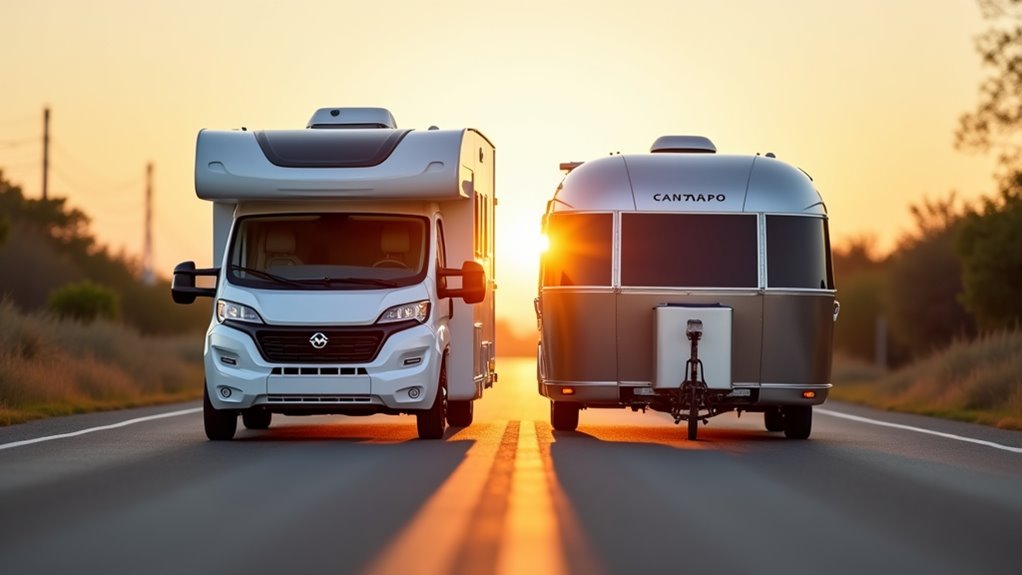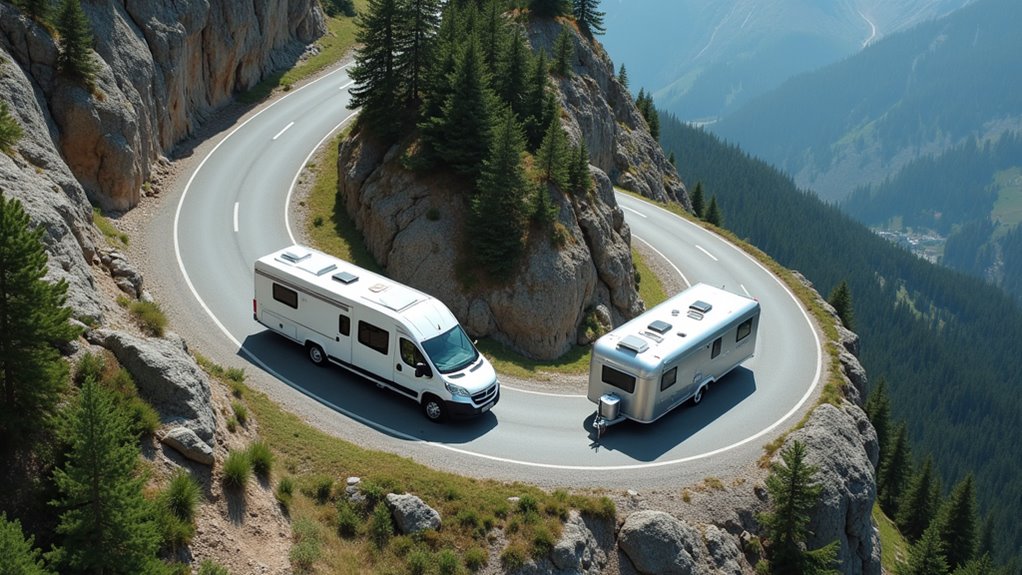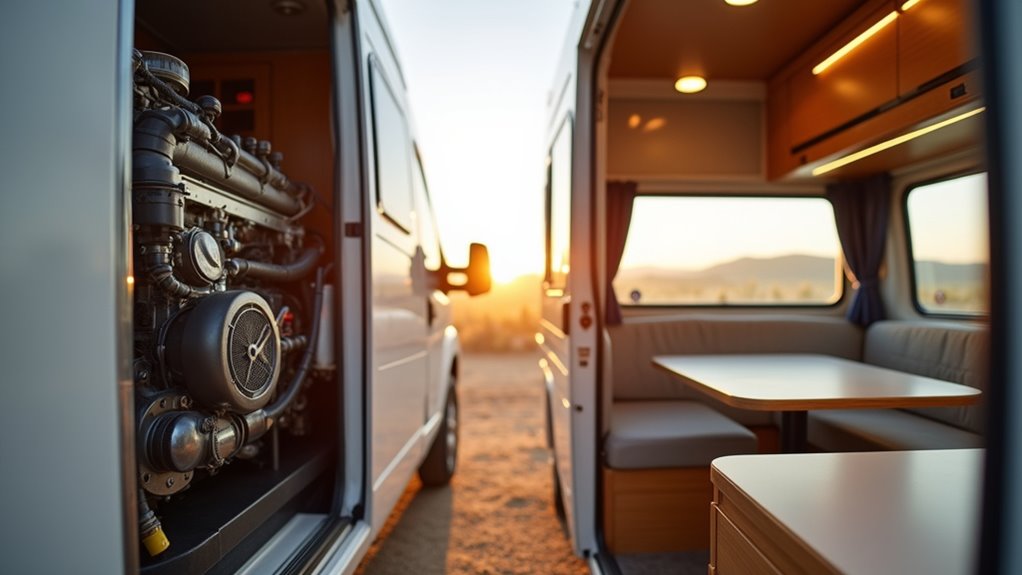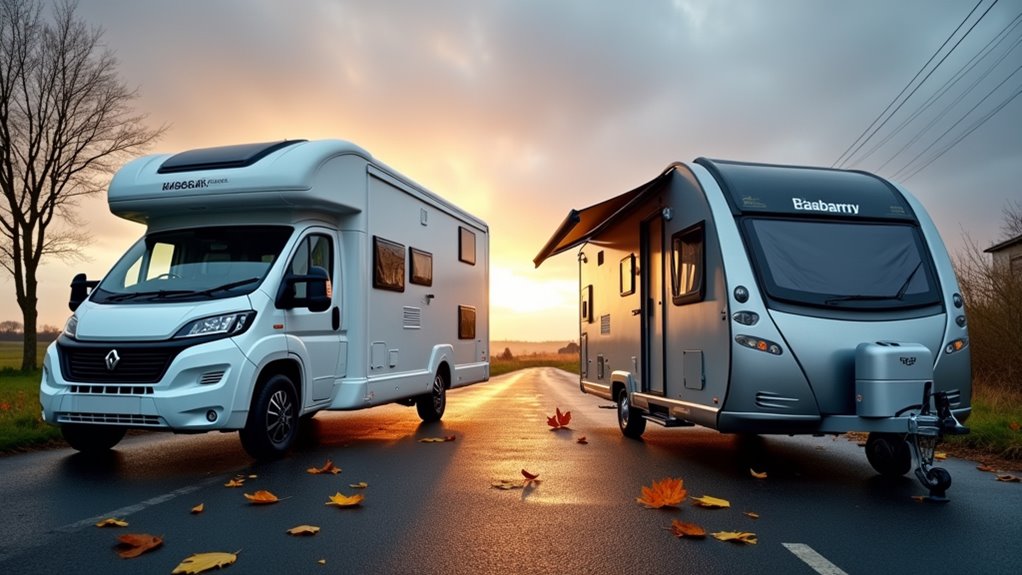Physical Address
304 North Cardinal St.
Dorchester Center, MA 02124
Physical Address
304 North Cardinal St.
Dorchester Center, MA 02124

Here's the ultimate breakdown of motorhome versus caravan ownership costs and benefits that could save you thousands on your next adventure.
Like Alice faced with two diverging paths, you’re standing at the crossroads of recreational vehicle ownership, weighing motorhomes against caravans. You’ll discover that each option carries distinct financial implications and lifestyle trade-offs that aren’t immediately obvious. While motorhomes promise all-in-one convenience, caravans offer surprising flexibility that might better suit your budget and travel style. Before you make this significant investment, there’s a essential cost comparison that could completely shift your perspective on which path leads to your ideal adventure.

When you’re planning your first RV adventure, understanding the basic difference between motorhomes and caravans will save you from costly mistakes. A motorhome is a self-contained vehicle with its own engine – you simply hop in and drive away. Think of it as your car and accommodation rolled into one unit.
A caravan, however, is a towable trailer that hooks onto your existing vehicle. You’ll need a car with sufficient towing capacity to pull it to your destination.
Once you’ve set up camp, you can unhitch the caravan and use your car for local trips.
Unlike motorhomes, caravans offer the flexibility to explore local areas without breaking camp or moving your entire setup.
Both options offer sleeping quarters, cooking facilities, and storage space, but they differ markedly in cost, convenience, and flexibility for your camping adventures. While both motorhomes and caravans fall under the RVing category, they each provide distinct advantages depending on your travel style and budget.
Since your budget often determines which RV type you’ll choose, let’s break down the real numbers you’re facing.
New motorhomes typically cost $60,000-$300,000+, while caravans range from $15,000-$80,000. However, don’t forget you’ll need a suitable tow vehicle for caravans, adding $30,000-$60,000 to your total investment.
Used options can slash these costs substantially. You’ll find decent used caravans starting around $8,000, while motorhomes begin near $25,000.
Financing options include RV loans (typically 10-20 years), personal loans, or dealer financing. Banks often offer better rates than dealers, so shop around.
Your credit score heavily impacts rates – expect 4-12% depending on your creditworthiness. Consider total cost of ownership, not just the sticker price, when making your decision.

While both options will get you to your destination, the driving experience differs dramatically between motorhomes and caravans.
With a motorhome, you’re driving a single, larger vehicle that handles more like a truck. You’ll need time to adjust to its size and turning radius, but parking‘s straightforward once you’ve found a spot.
Caravans require towing skills and constant awareness of your extended length, especially when reversing or steering through tight corners.
Consider these key differences:
Beyond everyday driving challenges, you’ll also need to consider how to secure your RV during severe weather events, as proper hurricane preparation requires specific techniques to protect your investment from high winds and storm damage.
Once you’ve settled into your campsite, the differences in living space become immediately apparent. Motorhomes typically offer more headroom and wider floor plans since they’re built from the ground up as living spaces. You’ll find better-integrated kitchens, larger bathrooms, and more comfortable seating areas.
Caravans, while more compact, maximize every inch efficiently. They’re often lighter on luxury features, which keeps costs down. However, you’ll deal with lower ceilings and narrower walkways.
Consider your budget carefully – motorhomes cost considerably more but provide hotel-like comfort. Caravans offer basic amenities at a fraction of the price.
Think about your camping style: if you’re outdoorsy and use your RV mainly for sleeping, a caravan’s limitations won’t bother you much. Regardless of which option you choose, finding affordable camping gear can help you maximize comfort while keeping your overall travel costs manageable.

Beyond the initial purchase price, you’ll face ongoing costs that vary dramatically between motorhomes and caravans.
Motorhomes require considerably more maintenance since you’re dealing with both vehicle and living components. You’ll need regular engine servicing, MOT tests, and mechanical repairs alongside habitation maintenance. Insurance costs are typically higher, and depreciation hits harder.
Caravans offer more budget-friendly upkeep. You’ll handle basic maintenance like checking tyres, brakes, and water systems, but there’s no engine to service. Insurance is cheaper, and depreciation is gentler on your wallet.
Key ongoing expenses to take into account:
Don’t forget to budget for quality warm bags if you’re planning cold weather camping trips in either option.
Your choice between a motorhome and caravan will considerably impact your fuel budget and how efficiently you can travel. Motorhomes typically consume 8-12 miles per gallon, while your car towing a caravan might achieve 15-25 mpg depending on vehicle size and caravan weight.
Fuel efficiency differs dramatically between motorhomes averaging 8-12 mpg and car-caravan combinations achieving 15-25 mpg depending on specifications.
However, don’t overlook the bigger picture. With a caravan, you’re maintaining two engines instead of one, plus you’ll need a powerful tow vehicle that often guzzles fuel even when not towing.
Motorhomes let you unhitch and explore destinations without dragging your accommodation everywhere.
Consider your travel style too. If you’re constantly moving between locations, a motorhome’s convenience outweighs the fuel penalty. But if you prefer staying put for extended periods, a caravan’s superior fuel economy makes financial sense.
For adventurous travelers seeking unique experiences, some glacier climbing trails in the US offer spectacular camping opportunities that require careful fuel planning regardless of your RV choice.

When winter arrives or you’re not actively traveling, finding adequate storage becomes a critical factor that’ll impact both your wallet and peace of mind.
Caravans offer distinct storage advantages since you can unhitch them at home, fitting into standard driveways or garages. You’ll save considerably on storage fees while keeping your vehicle for daily use.
Motorhomes present bigger challenges:
Both options require proper winterization, but caravans win the storage game. You’ll maintain easier access for maintenance, avoid monthly fees, and won’t need to find commercial storage space that accommodates larger vehicles.
If you’re considering a more minimalist approach to travel, backpacking adventures offer an alternative that eliminates storage concerns entirely while providing maximum flexibility for exploring destinations.
While storage costs matter in the short term, understanding how well your investment holds its value over years of ownership will considerably impact your total cost of ownership.
Motorhomes typically depreciate faster than caravans, losing 15-20% annually in their first few years. You’re fundamentally buying a vehicle that’s constantly aging mechanically and cosmetically.
Caravans hold value better since they lack engines requiring expensive maintenance. A well-maintained caravan can retain 60-70% of its value after five years, while motorhomes often drop to 40-50%.
However, premium motorhome brands like Hymer or Bürstner depreciate more gradually than budget models. If you’re buying used, motorhomes offer better initial value since someone else absorbed the steepest depreciation.
Consider your planned ownership duration when weighing these investment implications. Regardless of which option you choose, keeping your camping gear organized with quality storage solutions will help maintain your vehicle’s condition and preserve its resale value.
You’ve heard the theory that motorhomes are money pits, but that’s only half true. Yes, you’ll pay more upfront and face steeper depreciation, but you’re buying convenience and comfort. If you’re budget-conscious and don’t mind towing challenges, caravans offer better value retention and flexibility. Your choice boils down to this: pay premium for integrated luxury, or choose modular savings with caravan versatility. Neither’s wrong—it’s about matching your wallet to your wanderlust.